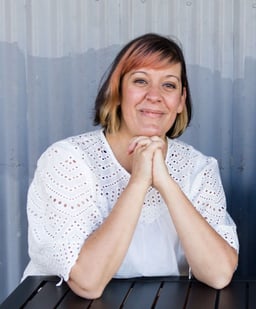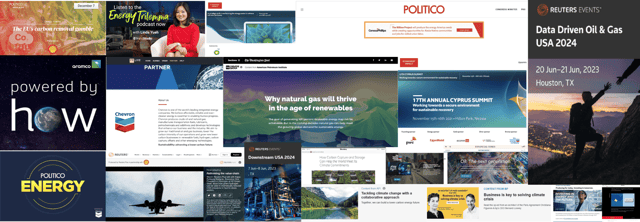
There’s a pervasive line of thinking amongst some climate folks that goes roughly: Who cares if I’m an asshole, we’re in a war! Or, more gently: if I’m using the same tactics as my enemy to achieve better ends, that makes the tactics good, actually.
It’s possible there was a time that I also thought trying not to be an asshole was a waste of time, but I don’t remember one. My attraction to the climate accountability beat has always been about fairness, a righteous sense of indignation, standing up for the little guy.
But there was definitely a time when I thought “Well, the climate movement is just a group of people, and in any group of people there will be assholes, why should this group be any different?” I’ll tell you why: because we’re in a fucking war!
And it’s a war of many things, but at least as much as all the other things, it’s a war of imagination and, oh god I’m gonna say it: moral clarity. It’s a war of hearts and minds, folks, that’s something industry propagandists have known for a very long time, and you don’t win hearts OR minds by being an asshole. How many times can I use the word “asshole” in this post? A lot of times!
Point being: it’s perfectly reasonable to expect the climate movement to behave less extractively than other groups.** I’d even go so far as to say it is incumbent upon those in the climate space to model what less extractive intrapersonal behavior looks like. I know, woah. And I include climate journalists in that. Particularly during this time where media is being upended—bought up by private equity and sold off for parts, or acquired by magnanimous billionaires and then gutted a few years later—why are we competing with each other for scraps when we could be banding together and showing everyone what real community, real collaboration looks like?
I’ve been working as a climate reporter for more than 20 years, but it’s only been in the last six or so that I’ve mingled overly much with the movers and shakers of either the climate movement or the media industry. I was never important enough and then I made something that people liked, something that framed the climate story differently but in that way where people went “god DUH why haven’t we been talking about it this way forever?! Climate is a true-crime story.” And so I became a target for extraction. People copied my work, fundraised off it, developed film treatments on it...all without ever even speaking to me. It was particularly galling because I had tried very hard to credit the people whose work had inspired me.
For the first season of Drilled, I wanted to draw attention to and build upon the excellent ‘Exxon Knew” reporting conducted by reporters at Inside Climate News, the Los Angeles Times, and the Columbia Journalism School. I scoured the documents they’d published, came up with a list of former Exxon Research & Development employees and consultants who were still alive, and set about interviewing them. Some were new sources, some had been interviewed by other reporters but told me things they hadn’t shared publicly yet. I went looking for new documents and historical records too, and I reached out to the reporters themselves seeking interviews. Two never answered, two told me their boss wouldn’t allow it, and one, Lisa Song (now at ProPublica), agreed to talk to me. In our conversation, Song told me she’d come onto the project at Inside Climate News when it was already underway and didn’t feel super comfortable being the only voice if the two lead reporters, Neela Bannerjee and David Hasemeyer couldn’t speak with me. In the absence of those journalists’ voices, I wanted to make sure to credit them appropriately, to note throughout the series where various documents had come from and whose work had created this new evidence for lawyers to run with. Once the podcast came out, I was quick to correct anyone who attributed the Exxon Knew documents to me, and direct them to the original reporting.
I still worry that I didn’t do enough, that it’s too easy for people to falsely credit me with research I didn’t do. In subsequent work, both in print and audio, I’ve made an even more concerted effort to be hyper aware of preceding work, and credit it appropriately. I’m sure I still mess up, but I spend an awful lot of time thinking about giving credit where it’s due. Which is why, when I saw documentaries released that were remarkably similar to my own work, both in framing and content, when I saw a BBC journalist crediting herself with a scoop I knew I’d reported two years prior, and written about several times since, when I heard from a source that a docuseries director had said, falsely, that I was consulting on her project, in order to gain access to this source, I was pissed. I’m still pretty pissed.
But I’m more concerned about the way that increasingly common extractive practices, both in climate journalism and in the climate movement more broadly, conflict with a key goal we're all supposedly working towards: to expose the ills of extractive practices and highlight the need to do things differently. At conference after conference, I was seeing people plagiarizing each other, taking credit for each other’s work, backstabbing, competing for money, and it all had me wondering... how the hell are you going to stop extractivism while being extractive?
Dr. Robert Brulle, a longtime climate researcher (and a source I’ve gone to multiple times over the years), has also had his work featured frequently in both press reports and documentaries, including the BBC production Big Oil Vs. the World, without credit. “I provided tons of material to her [BBC producer Jane McMullen] and even wrote the definitive peer reviewed article on the Global Climate Coalition, and no acknowledgement at all,” he fumed on Twitter when the series was released. And later to me: “I spent days getting her material and explaining the history to her. This is really unethical exploitation.”
Weeks later, Dr. Brulle wondered if perhaps the individualized nature of some industries—particularly journalism and documentary filmmaking—has lent itself to extractive practices. I wondered if the same issue wasn’t also at play amongst individuals and organizations competing for the same grant funders’ attention. “Ideally, the ethics of the academic community would apply,” Brulle said. “While academia is intensively competitive, creating knowledge is recognized as a collaborative enterprise that builds on the work that came before you.”
In academic papers, that means full disclosure of all materials, along with full citations of the work that helped inform your research, and full acknowledgement of the contributions of others. “Understanding climate obstruction efforts is a collaborative enterprise,” Brulle said. “Uncovering and exposing how vested interests have been able to stop meaningful climate action for decades is a long term collective effort. We need to work together to build our understanding of how this effort works and how we can possibly counter it. Certainly individuals should get credit for their contributions. But failing to acknowledge that this is a cumulative effort and taking credit for others contributions, while it might serve short term individual interests, works to undermine the creation and maintenance of a collaborative and cooperative community of journalists, documentary filmmakers, independent researchers and academics.”
Writer and academic Yasmin Nair notes that even with the very clear rules around attribution in academia, what she calls “soft plagiarism” abounds. “Soft plagiarism is when you take a concept or an analysis or framing or source material, structural arrangements, and re-do it in your own words,” she explains. “It happens a lot in academia, and in journalism, and in publishing more broadly, and it can usually be avoided by the very simple, collegial act of acknowledgement.”
Plagiarism, soft or otherwise, has become something of a hallmark of the so-called “knowledge economy,” and, as the writer Jonathan Katz pointed out when he discovered a podcast episode lifted almost entirely from his book, Gangsters of Capitalism, podcasts are part of the problem too. “As the appetite for podcasts balloons, listener (and advertiser) demand far exceeds the number of ethical journalists, documentarians, and other nonfiction specialists available to even talk about their own reporting, let alone do original work,” he wrote in his newsletter The Racket.
Social media has also kicked this practice into overdrive. “A lot of people have been saying this for a while, especially women of color,” Nair says. “There are people on social media who are these gigantic whales just going through and sweeping up a bunch of stuff and presenting it as their own. Social media enables soft plagiarism so easily.”
Other extractive practices are common in journalism as well, some so much so that we even have terminology for them: parachute journalism anyone? As a local reporter in Texas, a big part of Amal Ahmed’s work is building relationships with sources. “Generally local reporters care about the community they’re living in and that’s what we lose when local papers are being decimated, but the New York Times is still out there winning awards,” she says. “What matters to me is do the people who live here read it and did they learn from it? To me that’s more meaningful.”
She’s particularly salty about The New York Times because they soft plagiarized a story she wrote as a fellow at the Texas Observer. “I stumbled on this story in 2019. A lot of these grassroots environmental justice groups had formed post-Harvey,” she explains. “Some local reporters covered it, and then I tried to tie it back to larger systems and patterns and put together this piece that went beyond Harvey to look at decades-old issues. It was super interesting to me, but I assumed five other people would read it because it was pretty wonky.”
She was surprised to see more outlets picking the story up, and then a year later a friend saw a New York Times piece that reminded them of Ahmed’s story. “I went into it thinking ‘oh it’s great that this grassroots group is getting attention!’” she says. “Then I read it and it was like okay there’s just no way this guy didn’t just re-tread what I did. It was the same documents, same sources, same nut graf.”
And yet, Ahmed said that story still managed to entirely miss the mark when it came to articulating the stakes of environmental justice. That’s the other big problem: when people extract sources and framing but don’t come at a story with the same depth of knowledge, they almost always get the story wrong.
Ahmed said that for her, simple acknowledgement isn’t enough. “Do something I didn’t do instead of just rehashing! Challenge yourself to go further,” she says. “If you see someone has already done something, do something different, answer another question.”
If those of us with the most extensive knowledge of the negative impacts of extraction were to consciously try to rid our personal and work lives of extractive practices—what would that look like? A spirit of collaboration, acknowledging the work of others, progressing the work forward rather than repeating the same story over and over, taking a collaborative view rather than focusing solely on individual achievement and competition…It sounds a lot like the sort of thinking required to deal with the climate crisis.
* In the interest of giving credit where it’s due: the first person who got me thinking about this sort of thing as being extractive, in the same way that energy and mining companies are extractive, was Larissa Ikeda.
This Week's Climate Must-Reads
Bonus:

